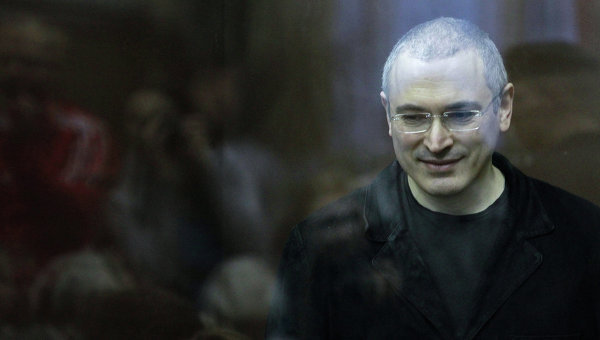MOSCOW, December 19 (RAPSI) – YUKOS CEO Mikhail Khodorkovsky, who has been in jail in connection with oil theft and money laundering charges since 2003, has filed a petition for clemency and a resolution pardoning him will be signed soon, Russian President Vladimir Putin said during an annual Q&A session with the press Thursday.
Khodorkovsky has already spent upwards of a decade in colonies, and has already endured serious punishment, Putin said. “[Khodorkovsky] refers to humanitarian circumstances. His mom is ill. From my point of view, taking into account all of these circumstances, a proper decision should be made and a clemency resolution should be signed in the nearest future,” the president explained.
Khdorkovsky's lawyer Vadim Klyuvgant told RAPSI that the defense has no idea who has filed a clemency petition on his client's behalf.
“He (Khodorkovky) didn’t ask (for clemency) and we have no recent information on somebody’s asking on his behalf. We do not have the information, however, for a number of years clemency petitions have been filed by different people,” the lawyer said.
Lawyer Anatoly Kucherena, head of Russia’s Public Chamber Commission for Law Enforcement Reform, told RIA Novosti that Khodorkovsky may celebrate New Years Eve with his family. It depends on the date on which the clemency petition was filed, he added. According to Kucherena, after the President signs the clemency resolution, it is expected to be forwarded to the governor of the region where the prisoner is being held, to the Ministry of the Interior, and to the colony. “It would be quite good if the President made a decision for Khodorkovsky to celebrate the New Years Eve with his parents and family,” Kucherena said.
In 2010, a Moscow district court sentenced Khodorkovsky and his business partner Platon Lebedev to 14 years in prison for oil theft and money laundering. They were expected to be released in 2017, taking into account the time that they had already served for their convictions from their first trial in 2005, when they were sentenced to eight years in prison for fraud and tax evasion. However, on May 24, 2011, the Moscow City Court reduced their sentences by one year.
Then last year, the Moscow City Court reduced the sentence again from 13 to 11 years.
In August the Supreme Court held that the sentences of Khodorkovsky and Lebedev should be lowered to 10 years and 10 months, thus partially satisfying their requests on supervisory appeal.
A working group for Russia’s Presidential Council for Civil Society and Human Rights analyzed the second YUKOS case and concluded in 2011 that the Criminal Code contained no provision under which the actions of Khodorkovsky and Lebedev could qualify as a crime. Last year, Investigative Committee spokesman Vladimir Markin claimed that some of those that had evaluated the legality of the second case were affiliates that had taken Yukos funds, according to RIA Novosti.
On this note, the president added today that from his point of view there are no perspectives for the supposed Yukos-funded analysis case. “Concerning the third case I haven’t gotten much into the details. As a man who is looking at it from outside, without getting into the details, I can’t see distinct perspectives,” Putin answered having being asked about the possibility of criminal persecution of experts.
The European Court of Human Rights (ECHR) in Strasbourg earlier held that the charges filed against Khodorkovsky and Lebedev were brought in accordance with the law, but that their rights had been violated in connection with the court proceedings and their placement in remote Siberian penal colonies.



